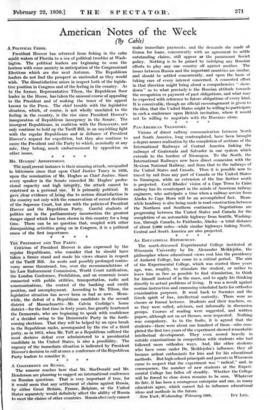THE PRESIDENT AND THE PARTY.
' Criticism of President Hoover is also expressed by the regular Republicans, who consider that he should have taken a firther stand and Made his views clearer in respect of the Tariff Bill. An acute and possibly prolonged contro- versy seems threatened, too, over the recommendations of
his-Law the Enforcement Conunission, World Court ratification, the London Conference, Prohibition, and on economic issues connected with public utilities; transportation, radio and communications, the control of the banking and credit position, and unemployment: According to Mr. Tilson, the legislative situation has never been so bad as now. Mean- while, the defeat of a Republican candidate in the second district of Massachusetts—Mr. Calvin Coolidge's home district—for the first time in forty years, has greatly heartened the Democrats, who are beginning to speak with confidence of a decided swing to the Democratic Party in the forth- coming elections. That they will be helped by an open break in the Republican ranks, accompanied by the rise of a third party, as in 1912, when Mr. Taft as a Republican suffered the most decisive defeat ever administered to a presidential candidate in the United States, is also a possibility. The urgency of the immediate situation is indicated by President Hoover's decision to call at once a conference of the Republican Party leaders to consider it.
* * * *










































 Previous page
Previous page